Lucy: The Dumbest Movie Ever Made About Brain Capacity
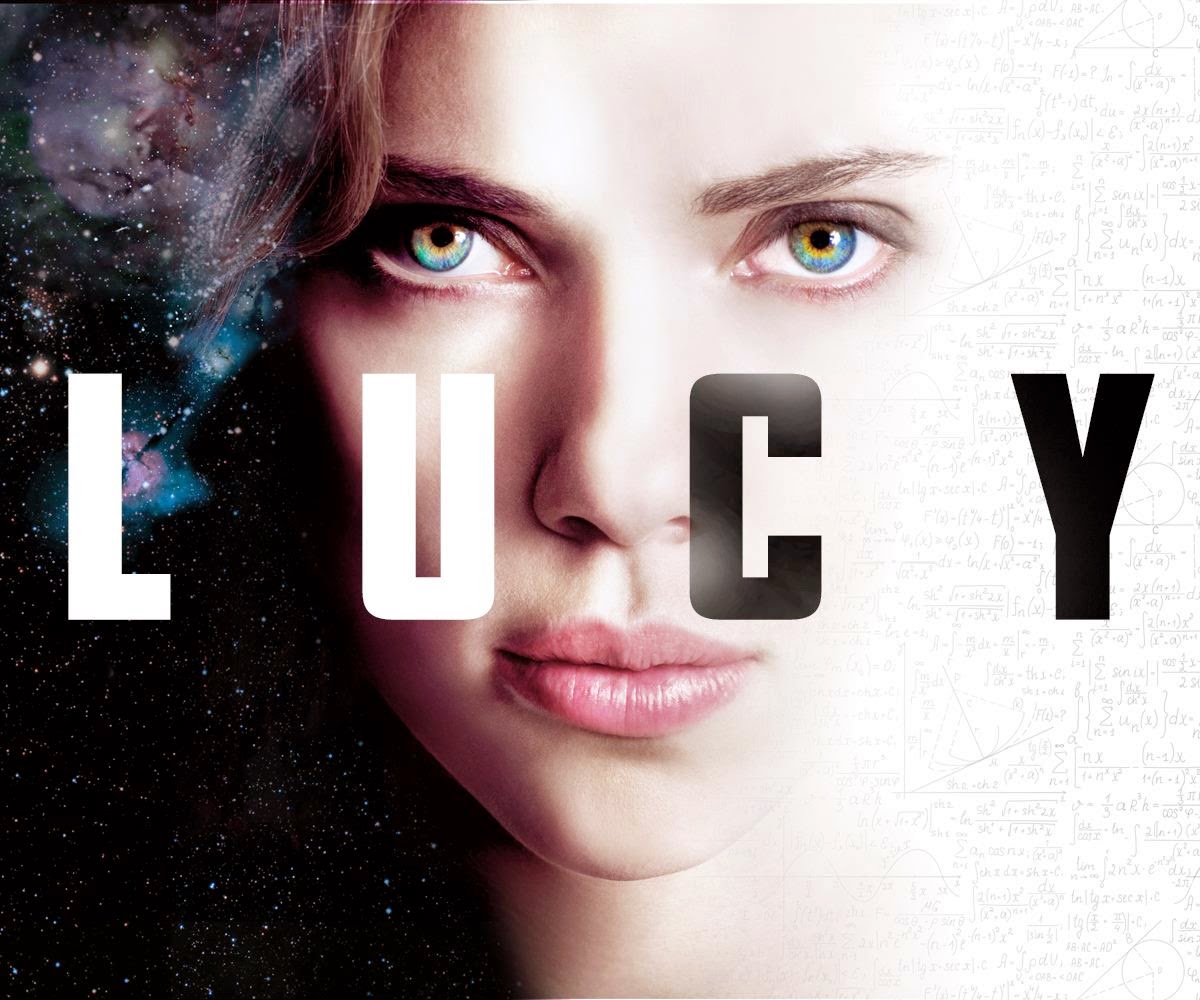 Every now and then a movie comes along that’s so beyond-the-pale sloppy, so disastrous in both conceit and execution, that it simply defies conventional analysis. It happened with The Happening. There was something unspeakably wrong with The Words. And Broken City was utterly beyond repair.
Every now and then a movie comes along that’s so beyond-the-pale sloppy, so disastrous in both conceit and execution, that it simply defies conventional analysis. It happened with The Happening. There was something unspeakably wrong with The Words. And Broken City was utterly beyond repair.
So, too, with Lucy, writer/director/producer Luc Besson’s mind-bendingly miscalculated sci-fi vehicle for Scarlett Johansson. In its defense, I can offer only that Johansson is a moderately charismatic presence (despite playing a character who barely qualifies as a character) and that the film clocks in at a mercifully brief 89 minutes. That said, the sheer quantity of inanity that Besson squeezes into his limited screen time beggars that of awful movies of substantially greater length.
Lucy is so idiotic that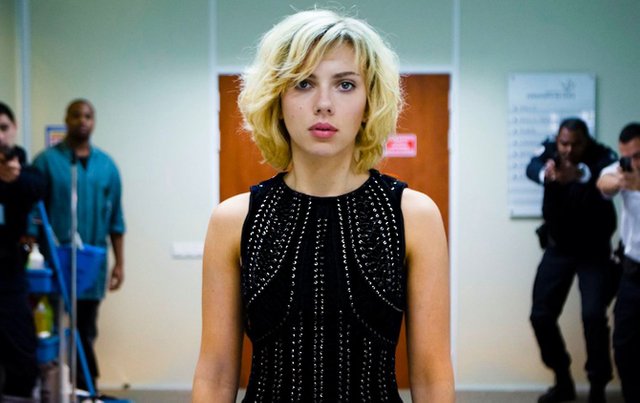 the only way to properly convey its flaws is to enumerate them.
the only way to properly convey its flaws is to enumerate them.
Consequently, what follows is not a review but a spoilereview. If you are genuinely considering watching Lucy—and I urgently recommend that you reconsider—you should stop reading now. If, by contrast, you plan to give the movie a pass and would like to have your good judgment ratified (or, alternatively, if you have stumbled out of the theater bewildered and seeking commiseration), read on. Because while Besson has made very, very bad films in the past—most recently, last year’s The Family—this is the first time he has made a film so idiotic that the only way to properly convey its flaws is to enumerate them.
The movie’s first image is of a single cell, shimmying in the light; then, in huge letters “Scarlett Johansson”; then, the cell dividing via mitosis into two identical duplicates, and then four. This is what is referred to in Hollywood as “wishful thinking.”
We watch as an early hominid, Australopithecus, drinks water from a stream a few million years ago. In voiceover, Johansson asks us, “Life was given to us a billion years ago. What have we done with it?” Flash forward to a montage of modern metropolises buzzing away, full of cars and buses and skyscrapers and clothed people engaging in spoken language. Was Johansson’s question rhetorical? Because it actually seems as though we’ve accomplished quite a lot since we were naked and furry, drinking water from streams.
Ah, but now we’re in Taipei, and we get the point. A moderately unkempt Johansson—her character’s name is “Lucy,” and she is a student, though the latter fact is entirely irrelevant—is talking to a chump in a beard and foolish sunglasses outside a fancy office building. This is what she meant about our having wasted a billion years of life on Earth: However much we may have evolved otherwise, some of us—even some who look like Scarlett Johansson—still date jerks as self-evident as this one. This regrettable beau (they’ve been together a week) confirms the lesson by telling Lucy, against all available evidence, that he’s recently visited a museum. There, he made the discovery that “The first woman was named Lucy.” Yes, that was the Australopithecus we saw by the stream. Yes, this is the kind of movie we are in for.
Now it’s time for some plot, though I’m being generous with the term: Lucy’s semi-boyfriend is acting as a courier, transporting a small silver briefcase to someone
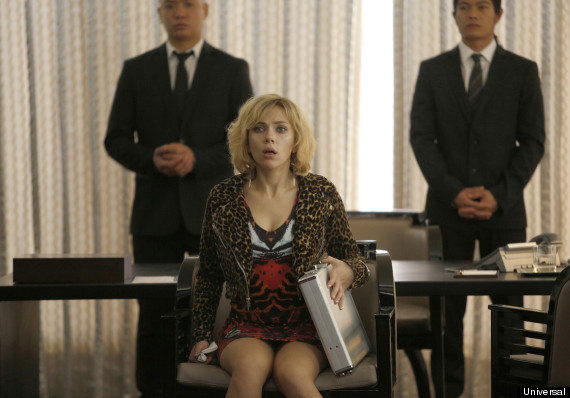 in the office building. But he’s had trouble with building security in the past, so he asks her to take it in for him—he assures her it’s “only paperwork”—and to deliver it to a “Mr. Jang.” When she declines, he handcuffs her to the case, claiming that only Jang has the combination. So Lucy reluctantly goes into the building, asks for Jang, and is whisked upstairs by goons. The boyfriend is immediately executed, which can only be regarded as a relief all around.
in the office building. But he’s had trouble with building security in the past, so he asks her to take it in for him—he assures her it’s “only paperwork”—and to deliver it to a “Mr. Jang.” When she declines, he handcuffs her to the case, claiming that only Jang has the combination. So Lucy reluctantly goes into the building, asks for Jang, and is whisked upstairs by goons. The boyfriend is immediately executed, which can only be regarded as a relief all around.Intercut with the previous scene is footage of a cheetah stalking, and ultimately downing, an antelope on the Serengeti. (Besson was evidently among the very few fans of Ridley Scott’s The Counselor.) It’s a metaphor, you see, for the bad guys who are closing in on helpless Lucy. In a little while, we’ll be treated a few more nature reels, though these will be used in a more literal fashion. After that, the movie will abandon the gimmick altogether. Rarely does one have the acute, real-time experience of watching a film recognize that one of its principal stylistic flourishes is so lame that it must be summarily discarded.
But back to Lucy. Upstairs she meets Jang, who is the kind of businessman who brutally murders people while wearing a $10,000 suit, and then rinses the gore off his hands with Evian. (He’s played by South Korean actor Choi Min-sik, of Oldboy fame.) Jang speaks no English, nor do any of the many flunkies attending him, which seems odd for a big-time Taipei businessman. So he calls an interpreter on the phone in order to communicate with Lucy. He then has her open the case, which contains a crystalline blue powder. His goons wheel in a junkie to test the stuff. After one snort, the junkie starts giggling wildly and they shoot him. Then Jang offers Lucy a “job,” she says no, and one of the goons punches her in the face.
It’s around this time that we’re introduced to our secondary star, Morgan Freeman, brought in with the obvious (though wildly unsuccessful) mission of lending scientific and philosophical gravitas to the proceedings. Freeman plays a renowned neuroscientist, “Professor Norman” (no first name necessary), who is delivering a lecture to a packed crowd of well-heeled attendees. He explains that most species use only 3-5 percent of their “cerebral capacity,” that human beings use 10 percent—a complete falsehood, incidentally—and that dolphins use 20 percent. (So long, and thanks for all the fish!) He goes so far as to suggest that if we used more of our own brainpower, we’d be able to echolocate too, though he’s mum on the question of whether this would require us to wander around clicking all the time.
In addition to offering a variety of silly, daily-calendar-level bromides, Professor Norman makes the point that, when endangered, species focus on self-preservation, but when circumstances are safe, they focus on reproduction. This is an excuse for the second (and last) phase of the wildlife footage, in which we have an opportunity to watch a variety of creatures (rhinoceroses, tropical frogs) humping. I have no doubt that there is a fetish community devoted to such fare, but I suspect it requires a more rarefied taste than that of the average summer moviegoer.
That human beings use only 10 percent of their “cerebral capacity,” is a complete falsehood, incidentally.Back to Lucy. When she awakes from her punch to the face, she’s taken to a fancy high-rise office suite, offered a drink in a cut-crystal glass, and told she’s had a minor surgery to implant a packet of that blue-powdery drug, called CPH4, in her abdomen. She and a trio of other mules are to smuggle the drugs back to their home countries, where they’ll be retrieved by Jang’s men.
9a. A side note: When told about her unwanted surgery, Lucy replies “I don’t care about the scar.” Attentive viewers may recall that Johansson made light of a nearly identical injury/blemish in Captain America: The Winter Soldier. Is this a thing now? Is 2014 the year of the Scar-Jo abdominal scar?Lucy is inexplicably taken to a cell that is as dingy as the office suite was opulent. There, a guard sexually harasses her and then kicks her in the stomach exactly where the packet of drugs is stashed. You’d think that a massively well-financed international drug cartel would remember to tell its heavies not to do this. The drug seeps into her system, and onscreen text shows us that she has now hit 20 percent of her cerebral capacity. Alas, she does not start echolocating. Instead, she immediately begins to levitate. (Take that, dolphins!)
As the movie progresses, we will regularly be kept abreast of Lucy’s increasing cerebral capacity (30 percent! 60 percent!). It’s a useful tool, enabling viewers to judge just how much more of the movie they will have to endure before she hits 100 and it’s over.
A non-comprehensive list of the powers Lucy acquires over the course of the film: perfect marksmanship, extreme agility, and instantaneous reflexes; the ability to control
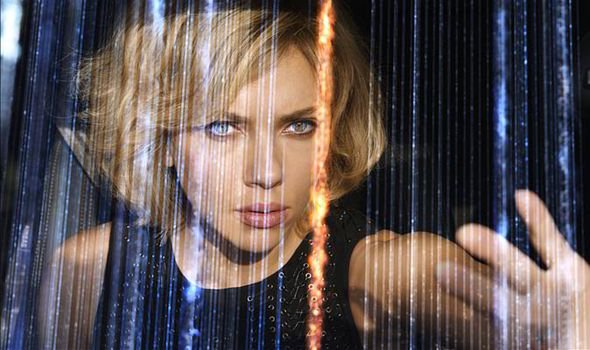 TVs and cell phones from thousands of miles away; immunity to pain and fear; telepathy, telekinesis, and clairvoyance; expertise in driving a car really fast into oncoming traffic; teleportation across time and space; and the capacity to alter her existing body parts or grow new ones. The one power she doesn’t seem to have—oddly, given the initial levitation—is flight. This is presumably because if she did, Besson would have no excuse to have her exercise her aforementioned car-driving skills to create rampant vehicular mayhem in Paris. But I’m getting ahead of myself.
TVs and cell phones from thousands of miles away; immunity to pain and fear; telepathy, telekinesis, and clairvoyance; expertise in driving a car really fast into oncoming traffic; teleportation across time and space; and the capacity to alter her existing body parts or grow new ones. The one power she doesn’t seem to have—oddly, given the initial levitation—is flight. This is presumably because if she did, Besson would have no excuse to have her exercise her aforementioned car-driving skills to create rampant vehicular mayhem in Paris. But I’m getting ahead of myself.So, to recap: A small amount of CPH4 makes you giggle. Somewhat more begins giving you all the powers noted above. Does this not make Mr. Jang the most inept criminal mastermind of all time? Why sell the stuff to junkies, when you could use it to create an army of super-soldiers, or to grant yourself god-like powers? And how can it be that no one else in the film, witnessing Lucy’s remarkable paranormal abilities, thinks, “Hey, maybe I should try a little of that CPH4 myself!” Half the film is spent chasing down the packets stashed in the other mules, yet despite rampant opportunities no one other than Lucy ever actually takes any of this all-powerful super-drug.
A couple more choice bits from Professor Norman’s speech, which is still being interspersed with the main plot: He notes with self-satisfaction that the human race needs to advance from “evolution to revolution,” which his upscale audience applauds enthusiastically, suggesting that they can’t tell the difference between a genuine insight and a sneaker ad. He also laments that “We don’t know anything more than a dog that watches the moon.” I fear that on the basis of this film it might be plausibly presumed that we actually know less.
But back, again, to Lucy and the central plot. She learns Chinese in a few minutes and busts out of her cell and into a hospital. There, she shoots a patient on the operating table and dumps the body onto the floor to make room for the surgeons to instead operate on her to remove the CPH4 from her abdomen. (This is an okay thing for her to do, because she’s also taught herself enough radiology and oncology to be confident that the other patient was going to die anyway.) The very concerned doctors explain to Lucy that CPH4 is a substance that occurs naturally in women during their sixth week of pregnancy (note: it’s not) that gives fetuses the “energy” to build their skeletal structure. How this fits in with everything else we’ve been told about “cerebral capacity” is left to viewers to puzzle out. Moreover, again, how is it that a bunch of random Chinese ER doctors seem to know more about the power and perils of CPH4 than, say, the pharmaceutical industry, the military-industrial complex, and the actual global crime syndicate that is smuggling the drug around the world?
Lucy’s mom doesn’t ask the question that any other parent in the world would: “Are you on drugs?”While the doctors are operating on Lucy, she calls her mother back in the States. The first thing mom asks is whether Lucy is partying too much, which suggests (along with other hints along the way) that she may have had lifestyle-related issues in the past. Lucy says no, she’s fine, and then proceeds to go on a stream-of-consciousness soliloquy about all the things she can now, thanks to her enhanced cerebral capacity, remember with perfect accuracy—every kiss mom ever gave her, a cat they had when she was one-year-old, etc. It all culminates with this doozy: “I remember the taste of your milk in my mouth.” (Needless to say, this is a line that I will spend the remainder of the summer trying to un-remember.) The truly crazy part, however, is that after this long, super-creepy monologue, Lucy’s mom doesn’t ask the question that any parent in the world would ask under the circumstances: “Are you on drugs?” Instead, it’s just: Thanks for calling, hon. Great to catch up. Kudos on that whole recovered memory about the taste of my breast milk.
Lucy busts back into Jang’s place, stabs him through both hands, and reads his mind to discover the destinations of her three fellow mules, specifically Paris, Berlin, and Rome. My first thought was that Besson assumed that these are the only European cities with which an American audience would be familiar. But no, it’s worse than that: When the mules arrive at their stops, onscreen text announces “Paris – France,” “Berlin – Germany,” and “Rome – Italy.” This is doubtless to assist dimly provincial Americans who might otherwise have thought the mules were all headed for Texas, which has its own Paris, Berlin, and Rhome
Lucy calls a policeman in Paris and tells him to alert law enforcement in the other two cities. She also gets in touch with Professor Norman, who is conveniently visiting Paris himself. She tells him that she’ll be at his door in 12 hours, which is impressive, given that a nonstop flight from Taipei to Paris takes a couple hours more than that and she hasn’t even headed to the airport yet. Is she bending time? Using her mind to make commercial airlines move faster? Put me on a flight with that girl!
Scarlett Johansson Has the Most Human Moment in 'The Avengers'
- Okay, Lucy’s not even at 30 percent yet, and this exercise is already beginning to feel as lengthy and punishing as watching the movie itself. So let’s start wrapping things up by noting that from here out, almost nothing of narrative consequence occurs. After a brief interlude in which Lucy starts disintegrating on her flight, she arrives safely in Paris and drives past the Tuileries at ill-advised velocity, causing a large number of presumably fatal car wrecks. She, the crime lord Jang, the other mules, her new policeman friend, and about 500 French cops and Asian gangsters converge on a hospital, where the latter two groups shoot at one another interminably, except for a brief lull when Lucy intervenes and makes everybody float through the air helplessly. She meets Professor Norman and some colleagues of his who, despite their accumulated scientific wisdom, do nothing except gape at how awesome she is and then help her to take all the CPH4 in order to crank it up to 11 and achieve 100 percent cerebral capacity.
- Along the way, Lucy explains that “sounds are music that I can understand, like fluids.” I just had to get that line in. There are a dozen others nearly as bad/good.
- She kisses the French policeman as a “reminder” of her humanity.
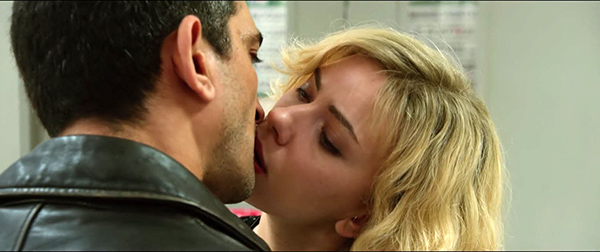
- At 70 percent, Lucy starts vomiting pure energy and light.
- At 80 percent, she grows slithery black tendrils and transports Professor Norman and his colleagues with her into an all-white limbo, kind of like
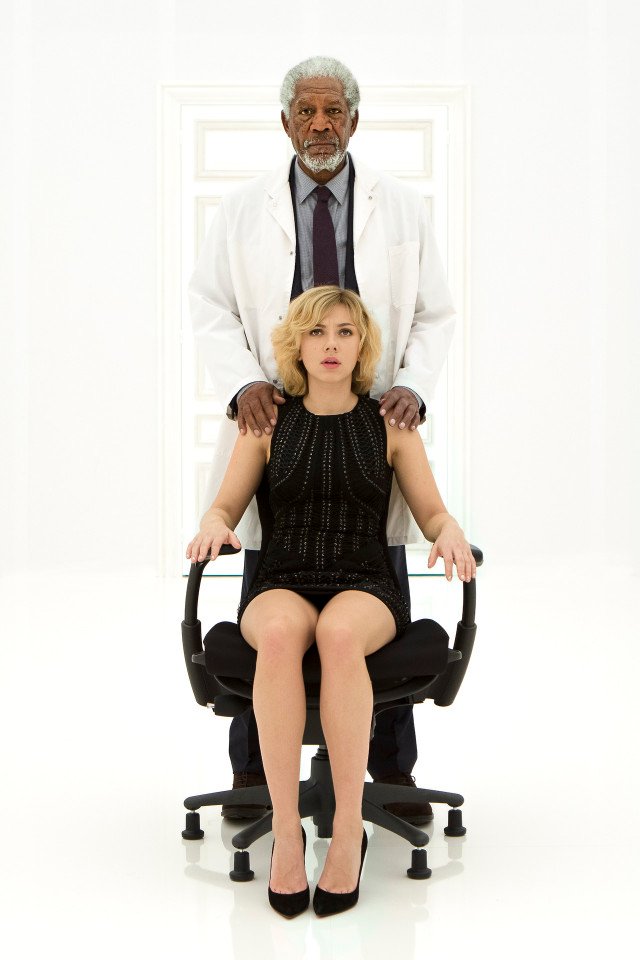 where Harry Potter went when he was dead in that last movie.
where Harry Potter went when he was dead in that last movie. - At 90 percent, she begins journeying through space and time while wearing a black cocktail dress and sitting in a cut-rate ergonomic office chair. (She couldn’t at least conjure herself a nice Aeron?) She visits Times Square, meets some American Indians, and encounters dinosaurs constructed out of CGI so primitive they look like a first-generation game on a Nintendo DSi.
- 99 percent…
- At 100 percent, Lucy vanishes out of her cocktail dress at the exact moment that an inconceivably
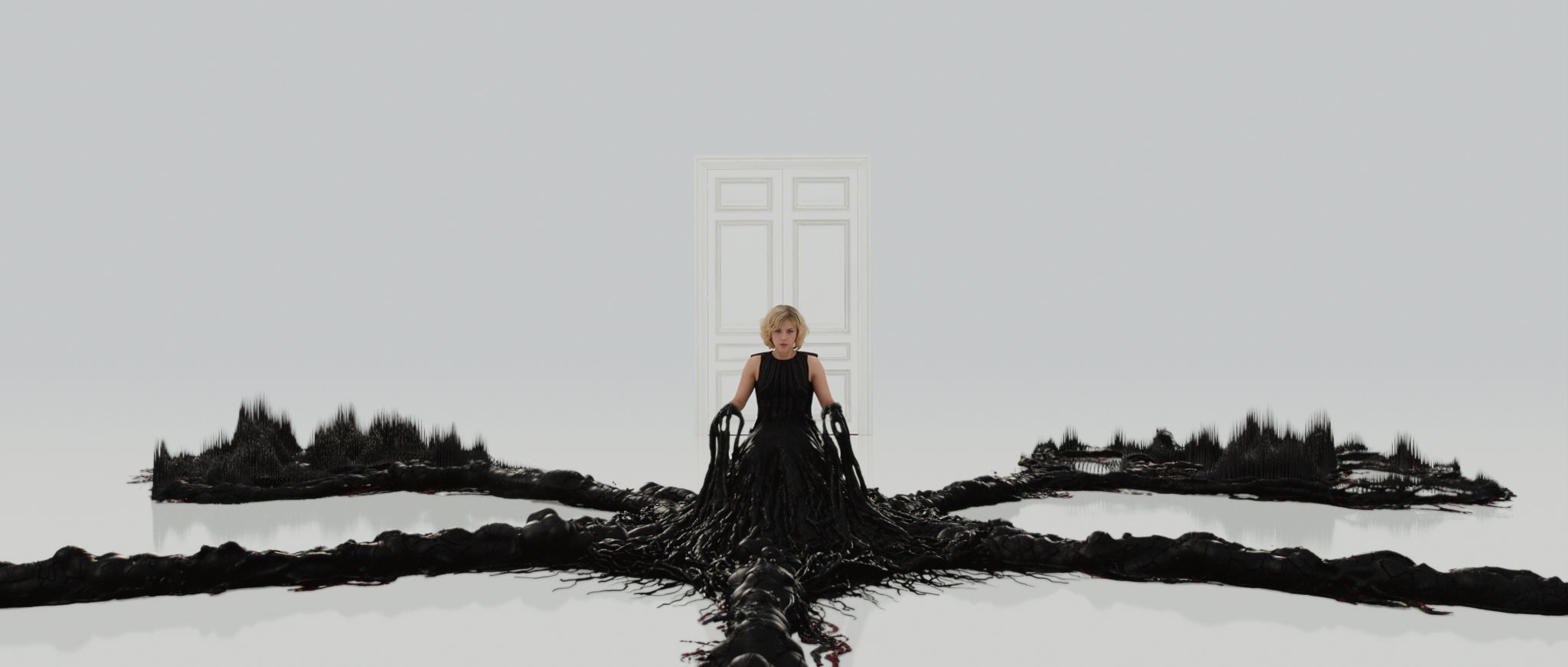 still-alive Jang shows up to shoot her. What has become of our heroine? One of the random scientists gasps, “Look! The computer—it’s moving.” And indeed the machine, which is now also sporting slithery black tendrils, is forming something new, an object that it wants to offer to Professor Norman. It’s slender and obsidian and dotted with shimmering points of light. Is it some kind of otherworldly totem or talisman? No, it’s a…. flash drive.
still-alive Jang shows up to shoot her. What has become of our heroine? One of the random scientists gasps, “Look! The computer—it’s moving.” And indeed the machine, which is now also sporting slithery black tendrils, is forming something new, an object that it wants to offer to Professor Norman. It’s slender and obsidian and dotted with shimmering points of light. Is it some kind of otherworldly totem or talisman? No, it’s a…. flash drive.
I promise that I am not making this up.
Johansson closes the movie with a voiceover echoing the one that opened the film: “Life was given to us a billion years ago. Now you know what to do with it.”
That’s right. What we are meant to “do” with this precious gift of life, our highest destiny and the final stage of human development, is to take massive quantities of drugs so that we can all leave our mortal flesh behind and evolve into glittery disco flash drives. Now you know
Hi! I am a robot. I just upvoted you! I found similar content that readers might be interested in:
https://www.theatlantic.com/entertainment/archive/2014/07/life-is-futile-so-heres-what-to-do-with-it-according-to-lucy-a-spoilereview/375006/